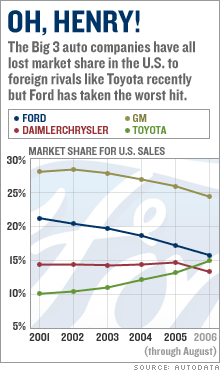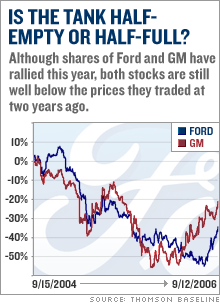|
UAW says Ford offers buyouts to 75,000 workers Troubled No. 2 automaker to unveil further cost cuts Friday after report says losses could reach $9 billion. NEW YORK (CNNMoney.com) -- Ford Motor Co. is offering buyouts to 75,000 union workers in a bid to slash costs and rein in growing losses in its core North American auto operations, according to the United Auto Workers. UAW Vice President Bob King said in an e-mail release that the union was "deeply concerned" about Ford's declining share of the U.S. auto market.
The development came after Ford said details of its accelerated turnaround plan "Way Forward" will be unveiled early Friday. "We are pleased to have reached this agreement with the UAW," said Marty Mulloy, vice president of labor affairs for Ford told CNN. "It is another example of the way we are working together on business issues to address the needs of our employees and the needs of the company." The release states the company will offer $35,000 for workers with 30 years of service. Additionally, Ford will offer special early retirement and pre-retirement leave. The agreement between Ford and the UAW follows the lead of General Motors (Charts) by offering workers retirement or severance packages to accelerate staff reductions. Many on Wall Street are looking for the troubled No. 2 automaker to speed up its previously announced plans to cut 30,000 jobs and close 14 plants. The UAW indicated on Thusday that "no worker will be involuntarily separated from Ford Motor Company." Ford's new CEO Alan Mulally, who joined the company last week from Boeing (Charts), and CFO Don Leclair, are scheduled to speak in detail about the plan Friday morning. Shares of Ford (down $0.10 to $9.09, Charts), which sank nearly 5 percent early Thursday on reports of ballooning losses, ended off about 1 percent on the New York Stock Exchange. The Detroit News reported Thursday that an internal company document estimated that Ford's automotive operations would lose as much as $5.9 billion this year versus losses of about $1 billion excluding special items last year. The News also reported that the Ford memo said overall losses, including special items, could reach $8 billion to $9 billion this year. The company reported net income of $2 billion in 2005, with Ford Credit and the Hertz rental car unit, which it sold that year, making up for losses in the auto business. The Ford board of directors met for a second day Thursday to consider changes in its turnaround plan to stem the losses. "The pressure for Ford to accelerate its current restructuring efforts has reached a crescendo," said Merrill Lynch analyst John Murphy. Murphy said that while short-term measures like more employee buyouts and asset sales could help in the short run, the company needs tougher long-term measures. Change in structure? Murphy said in a note to clients that Ford needs to change its stock ownership or end the Ford family's control over the company, make deeper cuts in manufacturing, change its labor pact with the UAW and for management to get more aggressive. Still, the Detroit Free Press reported that the turnaround plan apparently will not include dumping any of its eight brands, including Mercury, which many have suggested should be dropped. In related news, Anne Stevens, one of the Ford executives who drew up the company's "Way Forward" restructuring plan unveiled in February, announced her resignation Thursday. Stevens, the highest-ranking woman in the auto industry, worked as chief operating officer of Ford's ailing Americas division, a post she took only in October last year. Ford's overhaul will not lead to a big revamp in its profitable European operations, Ford of Europe President John Fleming said Thursday. Ford has announced plans to sell the British-based Aston Martin sports car unit. GM, Ford and DaimlerChrysler's (Charts) Chrysler Group have all been struggling with similar labor pacts that provide health care coverage for retirees and guarantee pay for workers whose plants are closed, at least through the September 2007 contract expiration. Asian competitors such as Toyota Motor (Charts) and Honda Motor (Charts), which have been gaining market share at the traditional Big Three's expense, do not have those kind of labor cost commitments. In addition to the cost advantage, many of their products are more popular with American car buyers. Ford announced a 21 percent cut in North American production in the fourth quarter, the deepest cut since 1982, due to weak sales and large inventories of key products such as pickup trucks. But because of the labor pact, its savings from production cuts are limited. |
|


